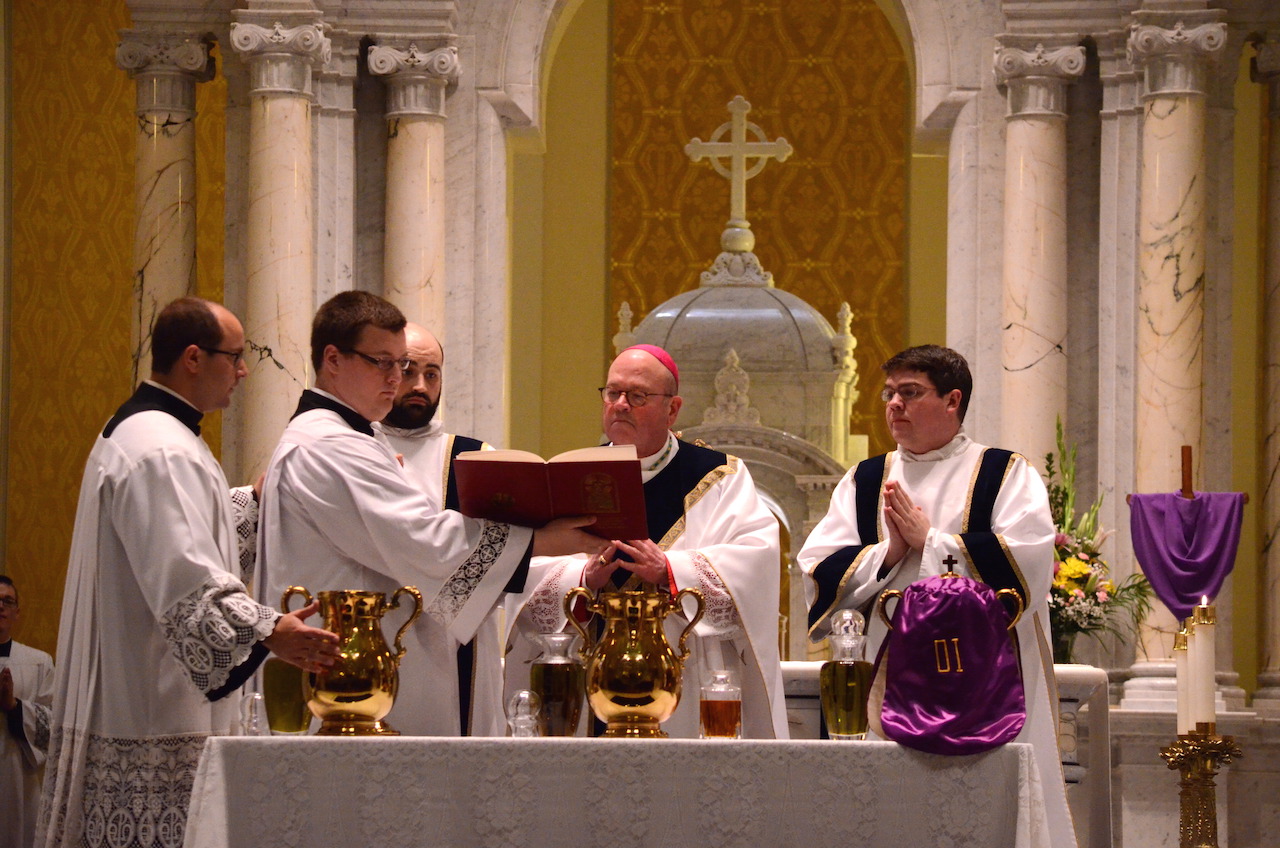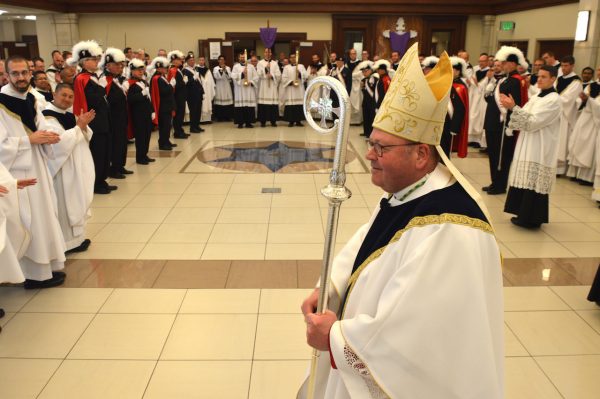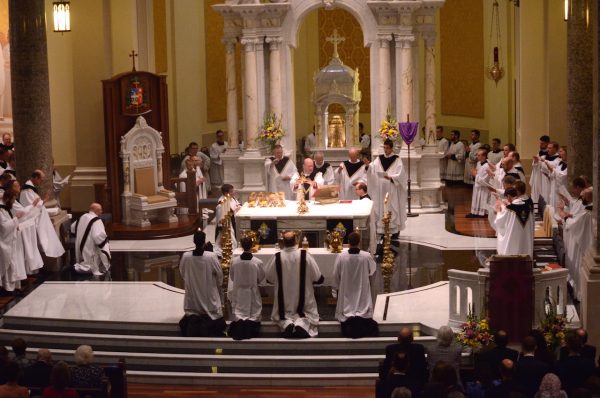Bishop Kemme: Diocese is at a crossroads

Bishop Carl A. Kemme prepares to bless the Oil of Catechumens and consecrate the Sacred Chrism at the end of the Mass of the Chrism Tuesday in the Cathedral of the Immaculate Conception. (Advance photo)
About the Chrism Mass
The Chrism Mass celebrates the unity of the priests of the diocese with their bishop. During the Mass the bishop blesses the Oil of Catechumens, the Oil of the Sick, and Holy Chrism, which is used in the administration of the sacraments throughout the diocese for the year.
Four priests were honored as jubilarians at the Chrism Mass Tuesday, April 16, at the Cathedral of the Immaculate Conception in Wichita.
Celebrating
50 years of the priesthood:
• The Rev. Thomas A. Welk, Missionaries of the Precious Blood
• The Rev. H. Patrick Malone
• The Rev. John Sherlock
Celebrating 45 years
• The Rev. Chrysostom Ah Maung
Diocese must look forward 30 years
The Diocese of Wichita, blessed for three decades by the fruits of a stewardship way of life, is at a crossroads, Bishop Carl A. Kemme said at the annual Chrism Mass Tuesday at the Cathedral of the Immaculate Conception in Wichita.
“[T]he decisions we make, the steps we take and the course we set in the next few years, will have a profound impact on that largely unanswered question: who are we becoming?”
Many dioceses and many bishops are speaking of similar realities in their respective dioceses, he said to a church full of representatives of parishes from across the diocese. “We are likely facing such a crossroad in the universal church as well. Sometimes, crossroads are moments of paralyzing fear or inertia. Sometimes, we are tempted to go backward to what we think is better. A crossroad requires of us prayerful discernment, faith, trust and courage.”
Over the past 30 or more years the Diocese of Wichita has experienced an unprecedented blessing of the stewardship way of life, Bishop Kemme said, adding that the fruits are evident: in the vibrancy of many parishes; in the fidelity given to the mission of Catholic schools; in the witness of the faithful at prayer coming day after day to adoration in churches and special chapels; in the call of young people to discern a vocation to the priesthood or consecrated life, resulting in the incredible gift of many young priests and young married couples choosing to have large families; and the life-changing efforts of so many who practice each day the spiritual and corporal works of mercy.
“These and so many other realities are powerful signs of a diocese, uniquely blessed, which has been calling each and every one of us to true and life-changing stewardship as a grateful response of a Christian disciple who recognizes and receives God’s gifts and shares these gifts in love of God and neighbor,” Bishop Kemme said.
Having acknowledged all of the blessings, he said he is more convinced than ever the diocese is at a crossroads.
“How long can we maintain this way of life?” is a question Bishop Kemme said he hears from priests and leadership.
“While I understand that sentiment, I am convinced that this is not the question that begs to be answered,” he said. “What does beg our immediate and undivided attention and commitment is that we open for us and for our children and their children a path to deepen, solidify, and renew stewardship so that future generations will embrace it and carry it forward as did their parents and grandparents. It is time for us as a diocese to look forward to the next 30 or more years and to boldly seek this path together.”
The future is not of maintenance but of mission
That path is not one of maintenance, he said, it is mission, rooted deeply in the Gospel. “I submit the path is discipleship bringing about in a gradual and transformative way the evangelization of our culture.”
Jesus did it by calling people to discipleship, to come and follow him, the bishop said. “The time he spent with ordinary people, sharing their lives, eating meals with them, walking along the dusty roads of Palestine together, going to their homes, building friendship with them and teaching them – all of this formed them into the disciples they would become, entrusting to them the timeless message of the Gospel.”
That radically changed their lives, he said, from fishermen to apostles, from sinners to saints, from curious observers to engaged servants of the Gospel.
“Isn’t that what we yearn for, thirst for today? Isn’t this what Jesus desired when at the Ascension, he instructed the Apostles to go make disciples of all the nations, baptizing them in the name of the Father and of the Son and of the Holy Spirit? It is this process that we must be engaged in in all our pastoral work, inviting, forming and encouraging discipleship. Everything we have done, are doing, and will do should be done in the context of discipleship.”
Bishop Kemme said it is vital for the future because true discipleship provides the foundation for a total stewardship way of life and gives its power and meaning. “Without it, stewardship becomes one program among many, or simply a means to an end, albeit, yes, a way of giving but only in order to receive,” he said. “I fear as do many that this is what stewardship means for too many of us. This will not sustain us for the future.”
Bishop has proposed a new pastoral vision
To change the conversation, to provide a new context for diocesan life, Bishop Kemme said he proposed last summer a new pastoral vision and mission for the diocese: “that all God’s children will respond to Christ’s call to become fully alive as missionary disciples and that our mission is to go forth and preach the Gospel and to evangelize today’s culture. If understood properly, I believe it signals this crossroads at which we find ourselves today.”
Referring to the Gospel reading of Luke 4:16-21, Bishop Kemme suggested that was what Jesus was feeling when he entered the synagogue at Nazareth. “For Jesus, too, was at a crossroads, a true moment of decision.”
Jesus didn’t sit around and wait, he moved and called others to join him.
“And that is what he needs us to do today in this time in our history. We need to work together to envision and plan a new approach to transmitting the faith in an increasingly secular culture. I think the best approach is the discipling that is modeled by the master, an approach that is less and less programmatic and more personal, one that is based on authentic friendship and faith sharing. It can be best summarized in this way: disciples making disciples.”
And everyone will have an important role to play in making disciples, he said: parents and grandparents, aunts and uncles, brothers and sisters, teachers, administrators, and neighbors.
“By listening to the stories of people’s lives, by sharing their joys and sorrows, their hopes and dreams, their successes and their failures, by inviting a person to share our life in some way, we can all be evangelizers and formers of disciples, just like Jesus did and just like the first disciples did after Pentecost,” Bishop Kemme said. “This is our duty by virtue of our baptismal call.”
Bishop honors priests at the Mass
He then directed his attention to the priests with him at the Mass urging them to renew their priesthood “by stirring into flame the gift we received on the day of our ordination, not a cowardly, lazy or defeatist spirit, but one of courage, zeal and passion for the ministry entrusted to us.”
Bishop Kemme said he and the priests could be great catalysts for the evangelization that is needed in these times. “But in order for us to do this, our prayer life must be intense and assiduous, our preaching must be dynamic and bold; our teaching must be authentic and true and our witness must be pure and sincere. Jesus is looking to us in a special way to ignite the fire of discipleship in our people.”
The oils blessed at the Mass and taken back by the priests and parish representatives are sacred signs of God’s redemptive work, he said.
“Oil in the ancient world was a sign of strength. These oils will be used to anoint our people and to strengthen their discipleship. The Oil of Baptism or Catechumens, anointing them on the road to discipleship; the Oil of Chrism anointing the newly baptized as priest, prophet and king, anointing the confirmed with the sealing of the Holy Spirit, anointing the hands of our new priests, for their indispensable role as mediators between God and man and anointing the altars and walls of new churches as places of worship communicating the presence of Christ; and finally the Oil of the Sick, anointing the infirmed disciple perhaps soon to meet the master after a life of faithful witness and service.
“All of these oils are to be used in a powerful way to form, strengthen and consecrate disciples by God for the building up of the community of believers, Christ’s Body the Church,” he said.
Bishop Kemme ended his homily by echoing the words of Jesus reading from Isaiah: “The Spirit of the Lord is upon us; he has sent us to bring glad tidings to the poor.”
“With the anointing of the Holy Spirit and the strength of our prayer may we go forth in the days, months and years ahead to preach the Gospel to all God’s children so that they too will become fully alive as Christ’s missionary disciples,” he said.


